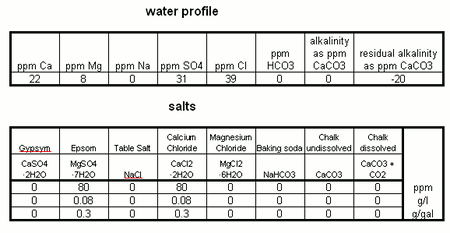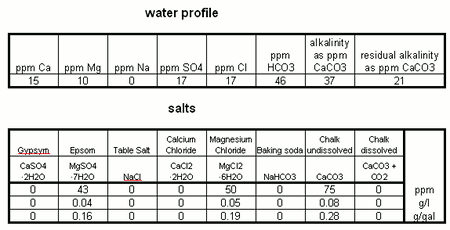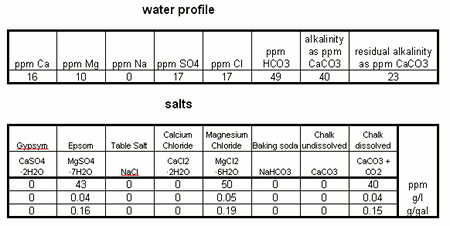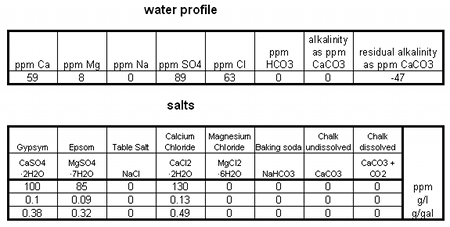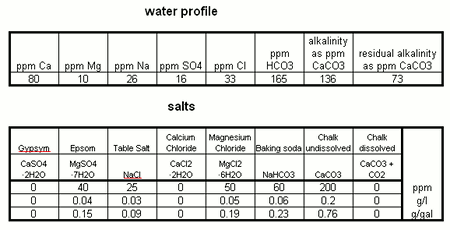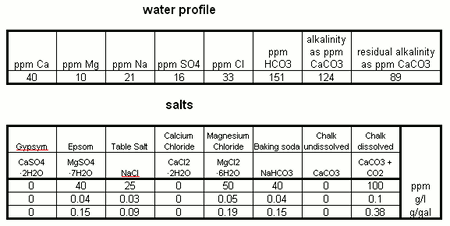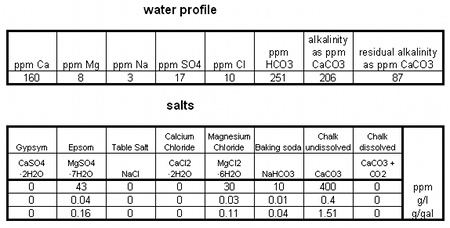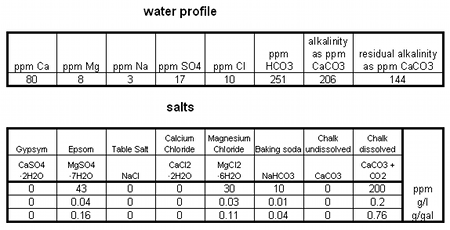Difference between revisions of "Various water recipes"
| Line 16: | Line 16: | ||
[[Image:Water_91_Helles.gif]] | [[Image:Water_91_Helles.gif]] | ||
| − | |||
works for: | works for: | ||
| Line 36: | Line 35: | ||
[[Image:Water_weihenstephan.gif]] | [[Image:Water_weihenstephan.gif]] | ||
| − | |||
| − | |||
'''with chalk dissolved with CO2:''' | '''with chalk dissolved with CO2:''' | ||
| Line 56: | Line 53: | ||
[[Image:Water_pilsner.gif]] | [[Image:Water_pilsner.gif]] | ||
| − | |||
| − | |||
works well for: | works well for: | ||
| Line 71: | Line 66: | ||
[[Image:Water_Schwarzbier.gif]] | [[Image:Water_Schwarzbier.gif]] | ||
| − | |||
| − | |||
'''with chalk dissolved with CO2:''' | '''with chalk dissolved with CO2:''' | ||
[[Image:Water_Schwarzbier_dissolved_chalk.gif]] | [[Image:Water_Schwarzbier_dissolved_chalk.gif]] | ||
| − | |||
| − | |||
works well for: | works well for: | ||
| Line 97: | Line 88: | ||
[[Image:Water_munich.gif]] | [[Image:Water_munich.gif]] | ||
| − | |||
| − | |||
'''with chalk dissolved with CO2:''' | '''with chalk dissolved with CO2:''' | ||
[[Image:Water_munich_dissolved_chalk.gif]] | [[Image:Water_munich_dissolved_chalk.gif]] | ||
| − | |||
| − | |||
works well for: | works well for: | ||
Latest revision as of 03:04, 6 March 2011
|
These water recipes are guidelines that brewers, who build their own water, can follow. None of these recipes have been optimized for a given style but the residual alkalinity is chosen such that it should yield a satisfactory mash pH when used for the listed styles. Since the acidity of the grist can vary significantly even for a given style additional adjustments might be necessary. All water recipes include a copy of my water calculation spreadsheet which can be used to make such adjustments. In that spreadsheet you may also enter a starting water profile if that is known. Some of the recipes used magnesium chloride. I got this salt from a fellow brewer who also keeps fish and used it to build water for the aquarium. If you don't have access to MgCl2, don't worry and just omit it or make up for it with some more Epsom salt. Some of these recipes give options for the use of dissolved chalk. Check out Building brewing water with dissolved chalk if you want to go that route. Contentsvery soft waterThis is a very soft water option for a Munich Helles or a Pilsner. I have used this for one batch and despite the low calcium level did not have problems with the getting the beer to clear. Paulaner, for example, uses a deep well from which they get very soft (~ 2 dH / 30 ppm CaCO3 Hardness) brewing water. I don't know if they are adding additional minerals when they brew their lighter beers with that water but it is very likely that they don't. I use this water with a 97% Pilsner malt and 3% acidulated malt (Sauermalz) grist and get a mash pH of about 5.3-5.4.
|
Brewing school Weihenstephan water
It is not often that I come across actual brewing water analysis data in the literature but the Markus Hermann's dissertation gave an insight into the water that is used for brewing studies at the Weihenstephan brewing school in Freising, Germany.
While it makes a great water for Weissbier, in fact the dissertation was about brewing Weissbier, it is not necessarily the water that the Weihenstephan brewery uses.
with unsdissolved chalk:
with chalk dissolved with CO2:
water_weihenstephan_dissolved_chalk.xls
works well for:
- Munich Helles (with the use of 2-3% acid malt in the grist)
- Weissbier (light and amber varieties)
Pilsner water
This water I have used for German Pilsner and American Pilsner with success. It has no alkalinity and a calcium level of ~60 ppm. This water, Pilsner malt and 2% acid malt in the grist should yield a mash pH round 5.4.
works well for:
- German Pilsner
- Classic American Pilsner
- Weissbier (lightly colored types)
Moderately alkaline water
This is the water I tend to used for dark German beers, in paticular for my Schwarzbier. There is a undissolved and dissolved chalk option.
with unsdissolved chalk:
with chalk dissolved with CO2:
works well for:
- Schwarzbier
- Doppelbock
- Weissbier (very dark varieties)
Munich Water
To create this water I went to the web page of the water department of the city of Munich and read the current water report. I was able to come close but could have come closer with the use of Magnesium carbonate. But in the end that won't matter much. This water capures the essence of the Munich water: high temporary hardness and low permanent harness. In English, there are much more bicarbonate ions in this water than chloride or sulfate. I use this water for dark Bavarian beers like Bock and Doppelbock.
While this is mimics the city water of Munich I don't know how many breweries actually brew with this water. Since it works well for dark beers, I would assume that a Munich brewer, who doesn't have his own water supply, would be using it without any treatment to brew these beers.
This recipe uses magnesium chloride. If you don't have that salt just leave it out.
with unsdissolved chalk:
with chalk dissolved with CO2:
works well for:
- Traditional Bock
- Doppelbock
- Weissbier Dark
- Schwarzbier
